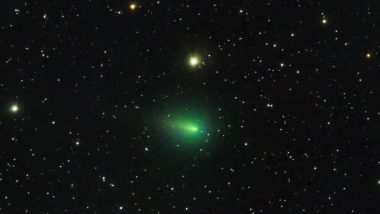A green comet that's speeding toward the inner solar system will soon make its closest approach to the sun. In exciting news for stargazers, the green comet, which was last seen during the Stone Age about 50,000 years ago, will be seen once again at the end of this month. Here's how you can watch the "cosmic snowball" live as it zooms past our star. The best part is it will be seen in India too, and you can watch it. Get all the live-streaming details here. Green Comet 2023 Visibility Date: C/2022 E3 (ZTF) To Come Closest to Earth on This Day for First Time Since Stone Age; Can Be Seen With Naked Eye.
Green Comet 2023 India
The best part of this celestial show is that the comet will be visible to the naked eye. The comet, named C/2022 E3 (ZTF), will light up the sky in the last week of January or early February. For a better and clearer look, one may visit the Indira Gandhi Planetarium Lucknow, where officials are ready to support the enthusiasts by providing them binoculars and a telescope to witness the cosmic show if bad weather does not hamper the view. According to astronomers, the best time to view the comet will be during dawn in the northeast direction. Green Comet, Last Seen During Stone Age Nearly 50,000 Years Ago, To Be Visible to Naked Eye This Month, Lucknow Prepares For Celestial Show.
Rare Green Comet Live Streaming Online
The Virtual Telescope Project (VTP)—a service provided by the Bellatrix Astronomical Observatory in Ceccano, Italy, that operates and provides access to robotic, remotely operated telescopes—is hosting a live stream that will show the comet speeding through space around the time of its perihelion. The live feed is scheduled to begin at 4 am Universal Coordinated Time on Friday and will last about an hour. That's equivalent to 11 pm Eastern Time and 8 pm Pacific Time on Thursday. You can watch it on their website. Check this Tweet for the details!
Here Are The Live Streaming Details
Coming Soon! 🔭☄️📸❤️
Join the #comet #C2022E3 live feed here: https://t.co/fPADt2FKHi pic.twitter.com/6lqlCLvHgM
— Virtual Telescope (@VirtualTelescop) January 9, 2023
The latest orbital elements suggest that the comet is currently travelling on an orbital path with an eccentricity of 1.00027, or in other words, a parabolic orbit. Such an orbit is not closed, so after it sweeps around the Sun, C/2022 E3 will move back into deep space, never returning again. So, this will be the comet's last time to be seen closest to the Earth, the website said.
(The above story first appeared on LatestLY on Jan 12, 2023 03:13 PM IST. For more news and updates on politics, world, sports, entertainment and lifestyle, log on to our website latestly.com).













 Quickly
Quickly





















